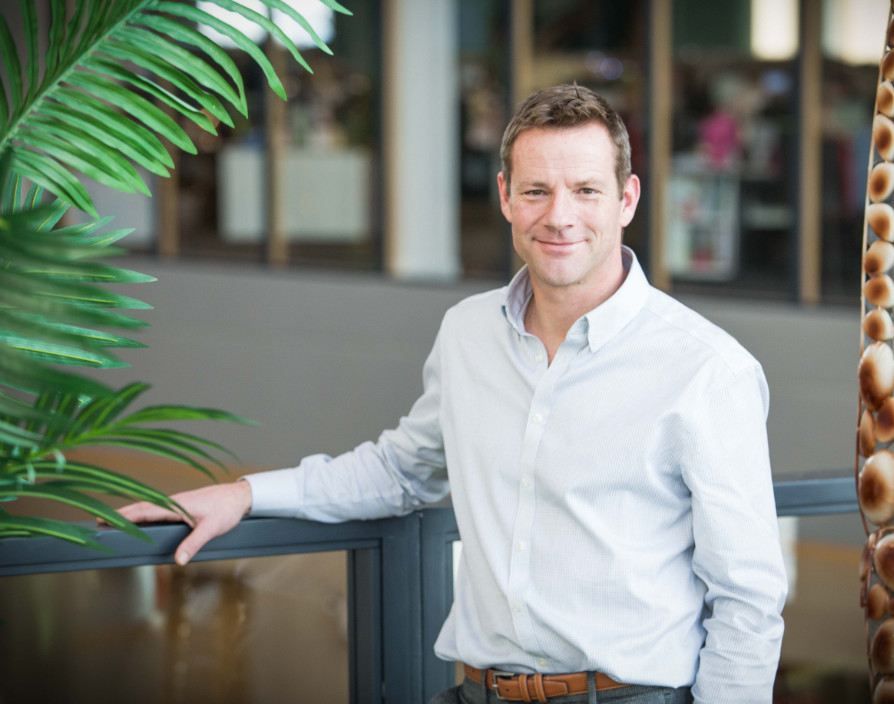By rights, interviewing Ed Reeves ought to be a piece of cake. If anyone knows about timely and informative responses, it’s the brains behind Moneypenny, the UK’s leading provider of telephone answering and outsourced switchboard services.
You expect him to be a good sport, too – literally. Prior to 2000 – the year he and his big sister, Rachel Clacher, launched the business – he’d made his name primarily as a windsurfer, channelling his get-up-and-go into competitive events worldwide. It doesn’t take much to make him go all misty-eyed about those glory days. Indeed, he beams at the memory of riding five-metre Barbadian waves from dawn to dusk, “the biggest grin possible on my face. Everything clicked. Incredibly challenging conditions that were only rideable if you were on your absolute A-game. I’ll unlikely ride anything like that again.”
These days, though, he’s a veritable business gold-medallist whose staff – 700 in Wrexham, Wales and another 50 in Charleston, South Carolina – handle in excess of 15 million calls and live chats a year. “I could come up with endless analogies. However, the key thing is that to succeed in anything, be that sport, business, parenting, whatever, you’ve got to commit and you’ve got to be brave. You have to make big sacrifices, which people always underestimate, and you’ve got to have absolute conviction that you’re doing the right thing. No one ever succeeded in business without taking bold decisions.”
So, let’s put the memories on hold for a minute and talk about Moneypenny, which under his leadership – he and Rachel are co-founders and directors – has won the Queen’s Award for Enterprise and been lauded by The Sunday Times as one of the 100 Best Companies to Work For. You might say it’s a reception service for people who can’t afford to miss phone calls, but that would be selling the £33 million enterprise short. Let’s just say it handpicks PAs for its clients, saves on the expense of a conventional, full-time receptionist and employs cutting-edge call-handling software to make firms appear ultra-professional, be they large outfits or sole traders.
Reeves’s journey – from ocean waves to soundwaves, if you like – hasn’t been the smoothest of rides. In fact, he’ll freely admit that the post-sporting life was something of a letdown. “I was freelancing in London, helping create, then marketing and selling a new brand of sports video,” he remembers. “I didn’t enjoy London life, but had no job outside to go to.”
Scouring the Yellow Pages – that’s right, the old-fashioned business phone book – by hand, he hit on the idea of becoming a graphic designer. “Vehicle livery and banners had a really low entry cost and I reckoned I could get clients easily enough. And I enjoyed graphic design,” he says.
“I didn’t want to do one-off projects, so I looked for organisations with fair-sized fleets. And as I was working from home, I wanted them to apply the graphics themselves. Net result was that I put graphics into shoeboxes along with instructions for councils to self-apply them. It did well and could have grown a lot more, but my heart wasn’t really in it, so I sold the business.”
The experience taught him a great deal, he says, “not least that service and convenience are far better buying triggers than cost. And growth is best achieved through creating recurring and retainable profit. That seems so obvious, but always marks the difference between a lifestyle enterprise and a corporate venture.”
In a roundabout way, the livery business led to Moneypenny. The initial spur was a less-than-happy experience with an answering service, which responded badly when a client phoned to say his fax machine was out of paper, Reeves, who was on holiday in the Canaries at the time, was livid to discover he’d lost out on an order from a local authority. But how does the old saying go? If life serves you lemons, make lemonade.
“That was the moment when I really felt that there was a better way that these businesses could be run,” he says. Armed with this newfound insight, he set about selling the concept of an outsourced PA service to Rachel. “We were both into our marketing. And we’d done a lot of hard yards and learned some good lessons between us, and the time had come to take a proper plunge into a bigger venture.
“It wasn’t so much a sell, rather a bouncing of ideas between us. We are oddly close for siblings and I think it’s fair to say that neither of us would have wanted to work with anyone else as a partner.”
Launching Moneypenny in such adverse circumstances flew in the face of everything he’d learned as a sportsman. There, the aim was “to do something similar to everyone else, but slightly better”. The trouble with taking a wholly different approach – known as “banging the corners” in windsurfing – is that in all likelihood, you’re going to come a cropper.
“When you’re losing a race with nothing to lose, you go for broke by sailing outside of the obvious course. The hope is that you’ll get a lucky wind shift,” he explains. “That’s what we did with Moneypenny, but at the start of the race. Fortunately, it worked!”
The novel idea at the heart of the venture was to take the impersonality out of answering services – to ensure, in short, that those taking the calls had built up a relationship with the people they were taking the calls for. It was an concept ahead of its time, so much so that when Reeves and Clacher went looking for loans, the banks wanted nothing to do with them.
That must have been tough. “Tough doesn’t come close,” agrees Reeves. “We were utterly penniless. Rachel was pregnant. I broke my leg windsurfing. We were pulling all-nighters, cleaning the offices, pinching furniture out of skips, loading up credit cards, stuffing mailing envelopes by night… the list is endless. We knew that we weren’t in it to stay small, we wanted to grow. And that meant that we somehow had to create ways of doing everything at scale, yet without any funds. It was a challenge.”
In terms of their responsibilities, the siblings “pretty much shared everything” in the early days. “I suppose Rachel leant more towards the people side and the finance. I was more focused on the technology and scope of services. We certainly shared the marketing, which we always knew had to be a priority to get spot on. We could kick our feet below the surface, but without clients, we’d get nowhere.”
Seed money consisted of £5,000 from an aunt and roughly twice that sum from credit cards and overdrafts. On the plus side, being frugal at the outset taught them valuable lessons “that we’d never have picked up had we had funds behind us. And as a result, we’ve stayed true to those learnings. Maybe we could have grown faster if we’d had the funds, but we’d have been a lot less profitable. We shaped the business to be cash-generative and self-funding out of necessity.”
Nowadays, he observes dryly, the situation is very different. “We’re the world’s largest business of our type, with big operations here in the UK and US. Most people in the UK have dealt with us, either on the phone or over live chat, and we handle tens of millions of business contacts every year. So, things have changed a lot. But the essence is still very much there.”
When did they realise Moneypenny was going to be huge? “There’s no single moment. Having our staff asking me to stop buying them Kinder eggs each time we won a client because they were eating too much chocolate was a very amusing point. Buying an office for 120 people when we only employed 12 was probably the key make-or-break point. And amalgamating our five UK offices into one purpose-built one was quite a shock to see everyone together. It’s odd how it’s the physical milestones that stick, not the financial ones.
“In terms of trading, we’d spent four years trying get through the door of large businesses as we knew we could handle large company switchboards far better than in-house receptionists. Yet we just couldn’t get a foothold. It was so frustrating, but we knew we were right. We had absolute conviction.
“Eventually we found the formula. It still surprises me how long it took, but that surprise is now eclipsed by the fact that this area now forms the majority of our business. Seeing this take off was wonderful. The same is now happening with our digital products and with Live Chat.”
As Reeves describes it, the winning formula sprang from one all-important idea: “Small businesses did not want nameless faceless call centres looking after their calls, yet they needed support to provide their clients with great service.”
Building the company into the success it is today, however, required skilful management. “We simply employed stunning people and assigned them to particular businesses. And the marketing; we created a formula that meant we could gain clients at a fixed ROI and the rate of gain could be flexed according to the business’s ability to deliver. That formula evolves constantly and now encompasses every area of the business, recruitment, marketing, everywhere.”
Presumably it has suffered mishaps along the way? “Plenty. And each one has been down to recruiting people. And when we’ve made a mistake, we’ve not reacted fast enough. Recruitment is hard and should never be underestimated. But not reacting swiftly when a recruit is wrong, that’s inexcusable. And we’ve been guilty a few times.”
One of the most worrying setbacks came in 2008, when the property market – taking its cue from the crisis-hit financial sector – started to wobble alarmingly. To Reeves and Clacher’s shock, Moneypenny’s call volumes suddenly dived, particularly among estate agents. “It was as if someone had turned the lights out on the property sector,” says Reeves, “and led to the only quarter of trading in which we didn’t grow substantially (although we did still grow).
“A close friend of mine said at the time, ‘If you think growing a business is hard, you should try reducing one.’ I think about that line often and it’s probably one of my biggest motivators to keep growing.”
To everyone’s relief, Moneypenny did indeed keep growing, spawning an array of competitors along the way. In the UK, they number about 350, says Reeves, with ten times as many in the US. “The market’s big enough for us all. We are, by a very large multiple, the largest and fastest-growing. This comes from being innovative and delivering great service with stunning people and technology.
“Almost without exception, our competition copies where we go. It’s flattering I suppose, and means they’ll stay behind us. I’ll take note when someone starts coming up with new ideas, innovations or routes to market which we haven’t.”
The firm’s promotional literature boasts knowing what it is to be a client is central to Moneypenny’s success. But after a couple of decades as the boss, that must be a stretch, surely? How on earth does Reeves manage to stay grounded? “I adore speaking to clients, and the day I stop doing that is that day that I need to quit,” he says bluntly. “They’re always delighted to be able to influence Moneypenny and so forthcoming with thoughts and ideas.
“And that’s what the team at Moneypenny do too. We’ve got tens of thousands of people, clients and staff, who all want to influence us for the better. So now it’s not just about me, it’s about giving everyone the opportunity and the voice to do the shaping.”
Bearing that in mind, what has been his proudest moment? “Whenever I’m in the office and I see a random member of our team stop a visitor or new staff member and ask if they need any assistance, I smile deep inside. That’s my moment of pride. It’s a simple thing, but it means the world to me. It means that they care, that they’re concerned about another person’s experience. And it means that we’ve successfully recruited that person because they have that ‘can do’ attitude.
“It’s probably one of the most intangible assets, yet is integral to our business, to any business. Anyone who’s visited any of Moneypenny’s office will tell you that we have incredible people here. People make businesses, not products or milestones. And I’m exceptionally proud of our people.”
With the conversation drawing to its natural conclusion, it seems as good a moment as any to ask about expansion plans. You don’t need to be a futurist to know that chatter about artificial intelligence (AI) is everywhere. “We’re surfing along at the moment,” says Reeves, wryly acknowledging his own sporting analogy. “We pick our waves carefully and are riding them hard with speed and confidence; the US, digital products and AI, and Live Chat. We’re a long way from done.”
Let’s zero in on AI for a moment, since that’s the transformative technology everyone’s talking about right now. A couple of years ago, Moneypenny’s management sat down to assess how, as Reeves puts it, “we ensure AI is our friend. It’s such an exciting area.
“We’ve got three areas that we’re utilising it: our digital switchboard uses years of data we’ve gathered to provide an experience for callers which is leagues ahead of any competitive product on the market; we’re harvesting text and call data on behalf of companies that want to feed their own voice and text-based AI solutions; and we’re supporting our own staff with AI to ensure that they’re always served with the appropriate information to best serve their clients’ needs.”
OK, one last question. What does the future hold, Mr Reeves? How will phone services look in the year 2030?
Considering how detailed his answer is, it’s clear he’s thought about this before, many times. “People will still be talking and will have come to enjoy the experience of a quality, digitally delivered service,” he says. “Voice calls will be reserved for the most important interactions. Office desk phones will be a relic of the past, as will the traditional office receptionist.”
Before long, he says, everyone will have their business phone as an app on their mobiles, which will handle business text as freely as voice.
On top of that, when people contact a business, their first impression of that company will depend on two things. “The quality of their digital switchboard – which will be AI-enabled and fuelled by a combination of generic sector and bespoke company data – and their ability to handle the ‘edge cases’: those moments where a caller truly does require human interaction.
“We’re already delivering both and considerably increasing investment in the AI aspects. And one thing we can be sure of is that 2030 will come a lot sooner than any of us think.”
Share via:








































